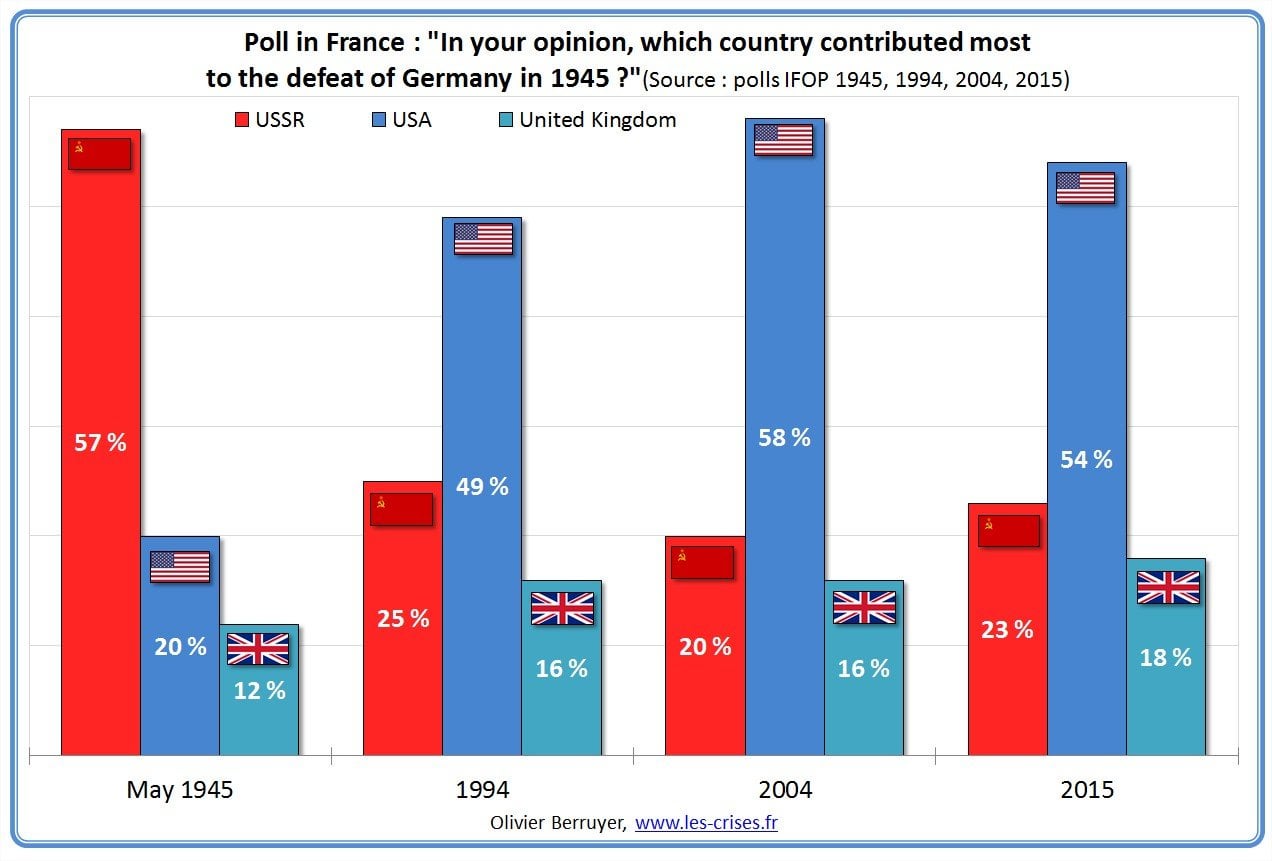Its pretty interesting that Germany has the highest number of people who believe the USSR did the most to defeat them. I mean they should know that.
I also never saw poll numbers immediately after the war. Really says something about how effective Cold War propaganda was.

Oh yes it most certainly does
that graph is depressing
Wonder how that vote would look if east and west German were split
I guess you tend to avoid paying the pollsters to go out and poll things you already know the answer to if you know you’re not going to like the answer being public knowledge.
The people of capitalist countries learn their history from movies and TV shows. Exhibit A.
 “I’ve watched Band of Brothers twenty-three times and never once heard anyone speak Soviet Unionian. So I think it’s pretty clear what the right answer is!”
“I’ve watched Band of Brothers twenty-three times and never once heard anyone speak Soviet Unionian. So I think it’s pretty clear what the right answer is!”Ah yes, the country that lost ~180,000 troops in the European theater and didn’t actually have any battles on it’s home turf did much more to defeat the Nazis than the continent-spanning nation that lost about 9,000,000 troops (not counting ~18,000,000 civilians).
For reference, in all it’s wars combined over 200 years, America has lost just over 1,000,000 troops in total.
That’s the famed efficiency of capitalism for you.
I need to know how many people in that 1-3% said Italy
Germans having the highest percentage still saying it was the Soviets is deeply funny.
deleted by creator
During this period of history the British were known mostly for hiding in the subway and worshiping their queen
13% of Americans have read a book in their lives
its because britain has a whole cottage industry of films and tv shows about how we were the last bastion against fascism in europe and like mythologising the blitz and the d day landings and GCHQ and the SAS and churchill and every brit is fed this nationalist soup from birth. So nowadays our fascist movement’s main defining characteristic is how much it celebrates soldiers who died killing fascists and how fascists celebrate the (supposedly single handed) defeat of Nazism at the hands of Britain in between doing nazi salutes and blaming Charles de Gaulle for every single thing that went wrong in ww2
I retract my statements about Germans. 31% of them are redeemable
Not only did the USSR do the most to defeat the Nazis, and not only did they lose the most… Hitler’s real focus was on the USSR. The Nazis opened the western front in part for revenge for Versailles, but mainly just to knock them out so Hitler could focus on the eastern front. Hell, Hess tried to make a bargain with Britain to keep them from getting involved.
Not to mention, “conquering” France and Britain was never the goal. Had the Nazis won the war, those nations would probably have to make significant economic concessions and “bend the knee” to Germany’s dominant position on the continent; but I believe their sovereignty and their borders would largely have been intact.
Not so for the USSR. Lebensraum was all about recreating what the US did to the native population of North America: annexing their land, killing the majority and enslaving the rest or driving them out past the Urals, and German settlers moving in. The war was existential for the USSR in a way it was not for France, Britain, or certainly for the USA.
[T]he war to the West remained ‘a political struggle’ (MacKenzie, 1995: 97), while to the East it was all‐out war. From the beginning, Hitler had regarded the war to the East not as ‘a formal battle between two states, to be waged in accordance with the rules of International Law, but as a conflict between two philosophies’ (Field Marshall Wilhelm Keitel’s Nuremberg testimony, quoted in MacKenzie, 1994: 505). Accordingly, [Fascist] propaganda described the conflict with the Soviet Union as one between two mutually exclusive worldviews, the Soviet one being branded ‘Jewish Bolshevism’ (Schulte, 1988: 228).
For Hitler (quoted in Streim, 1982: 27), this meant specifically that the army had to distance itself from the traditional point of view that still held fast in the West, according to which enemy soldiers were comrades‐in‐arms united by a shared set of values and a sense of professional solidarity: ‘The communist is before [the war] not a comrade‐in‐arms and after [the war] not a comrade‐in‐arms’. With nothing uniting the actors in this conflict, there was also nothing that called for restraint, as it was not the aim of the war in the East ‘to conserve the enemy’ (Hitler, quoted in Hartmann, 2009: 309, footnote omitted).
Schulte (1988: 150) in this respect writes that ‘documents from the highest level impressed on the [Axis] troops [on the Eastern front] that they were engaged in an ideologically based racial war of extermination […] that was by its very nature qualitatively different from the conventional war […] conducted in the West’. According to Hitler, the point in this war was not to win against the enemy, but to eradicate him once and for all (Streim, 1982: 27).
[The Third Reich] thus approached its relation to its Eastern and Western enemies in two fundamentally different ways: To the East, local populations as separate entities were to disappear through eradication or assimilation, with [the Third Reich] expanding into their territory, while to the West, relations between the enemies as separate entities were expected to outlast the war, hatred being understood merely as a symptom of current hostilities that should not replace mutual respect as the fundamental characteristic of relations.18
(Emphasis added. Source.)
Britain should still rank before the Americans in Europe, if people have to be delusional enough to erase the contributions of the USSR at least get the western country that did more of the fighting and dying right.
Weird how even with very prominent media still acknowledging reality in the 1960s/70s, Americans still can’t understand that the USSR did the most. My dad really liked Hogan’s Heroes and I remember the constant recurring “joke” was that the Eastern front was hell on earth with the most intense fighting and being deployed there was effectively the worst punishment a Nazi officer could receive.
deleted by creator
As in the First World War, the United Kingdom (UK) would have to turn to the United States of America (USA) for supplies on the scale necessary for a large army. […] Overseas finance in the Second World War came to depend on the willingness and ability of the U.S. government to persuade Congress that it was in America’s interests that the British war effort should be sustained. […] However, with first lend–lease and then the USA’s entry into the war the British Army became increasingly reliant on American‐supplied equipment: for example, from 1942 more than half of the British Army’s new tanks came from the USA.43
(Source.)
Of course, Wall Street was ground zero for the Great Depression, which arguably makes Imperial America’s important contributions to the European Allies less impressive: solving a problem that you started is the responsible thing to do, but it should be baseline and rarely laudatory.
While we can still give some credit to the Western Allies for defeating the Axis, few historians disagree that the Soviets contributed the most to vanquishing the Third Reich. Even Winston Churchill, as much as I loathe him, conceded that the Soviets ‘t[ore] the guts out of the’ Wehrmacht.
Now this is typically when antisocialists refer to the Lend–Lease Act, whose importance they exaggerate to comedic extremes. While the Lend–Lease Act was undoubtedly helpful to the Soviets, we really have no good reason to believe that it was decisive to the Allied war effort:
From 1941 to 1945, total lend–lease aid to the Soviet Union accounted for only 5% of the Soviet GDP in total. And it is a salient point that over 80% of the aid was received after June 1942, when the tide of the war had already turned against the [anticommunists] on the Eastern Front. The Soviets had already won the critical battles of Moscow, Stalingrad, and Kursk. [Fascism] was already losing the war when Lend–Lease to the Soviet Union had any significant effect, and that effect was minuscule compared with Soviet production at the time. By the time the first Sherman laid its tracks on Soviet soil, the writing was already very much on the wall for the Third Reich.
Although Stalin, Khrushchev, and other Soviet politicians were very complimentary about the Lend–Lease program helping them win the war, the statistics tell a very different story. The noted historian David M. Glantz points out in this regard,
“Lend–Lease aid did not arrive in sufficient quantities to make the difference between defeat and victory in 1941–1942; that achievement must be attributed solely to the Soviet people and to the iron nerve of Stalin, Zhukov, Shaposhnikov, Vasilevsky, and their subordinates…”
He further states that without Lend–Lease, the Soviets still would have won, but the war would have taken 12 to 18 months longer.
(Source.)















